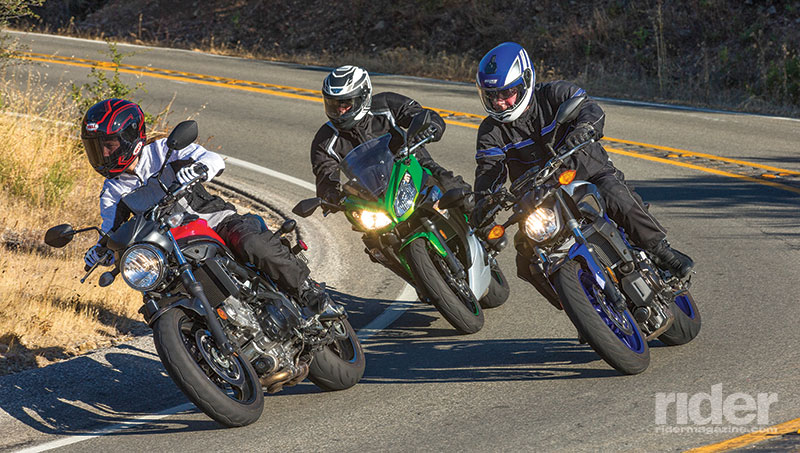
Fun Size Rides
You learn a lot about yourself, as a motorcyclist, working at a magazine like Rider. It has something to do with the warehouse full of bikes, all of which are available for your riding pleasure on any day of the week. And when spoiled for choice, I’ve learned that the bikes I keep returning to when I just want to go out and ride are often like the three in this comparison.
They aren’t the biggest, baddest, fastest or loudest. They don’t have a lot of cargo capacity, wind protection or touring-plush ergonomics for long trips. They are, like the candy bars you give out on Halloween, “Fun Size”—enough to quell your craving for a sweet ride, but not so much that those with a smaller appetite will be turned off by the portion size. They’re spunky, with manageable powerbands and decent handling, and they’re affordable, in terms of purchase price, maintenance, fuel and insurance. But choosing a favorite isn’t an easy proposition, and I decided that mine is the one I find myself drawn to when throwing open the warehouse door: the one that’s the most fun.
This trio shares a few similarities: fuel injection but no throttle-by-wire or fancy ride modes; simple, mostly non-adjustable suspension; skeletons of cost-effective steel; and a willingness to run on regular gas. Beating at the heart of each is a twin-cylinder engine (a 645cc 90-degree V-twin in the Suzuki, a 689cc parallel twin in the Yamaha and a 649cc parallel twin in the Kawi). For as much as they share, however, these three Fun Size machines offer surprisingly different riding experiences, and your favorite will likely depend on what kind of candy bar (i.e., riding experience) you’re craving.
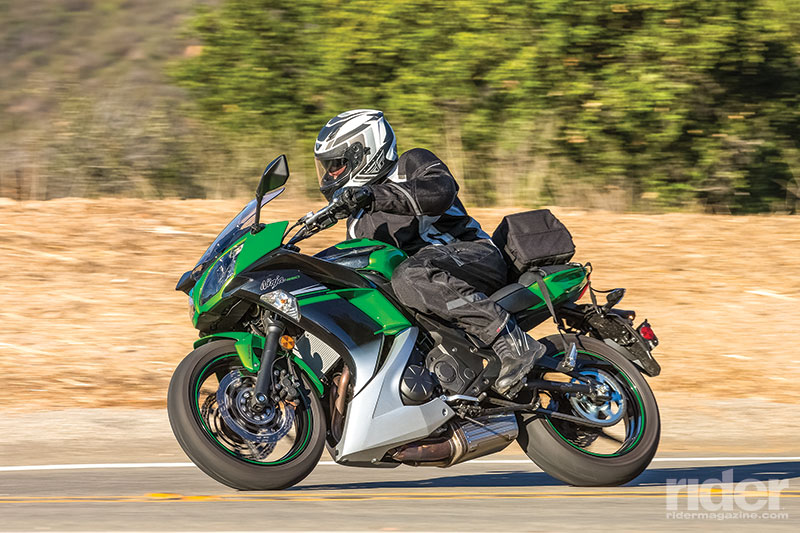
THREE MUSKETEERS:
KAWASAKI NINJA 650 ABS
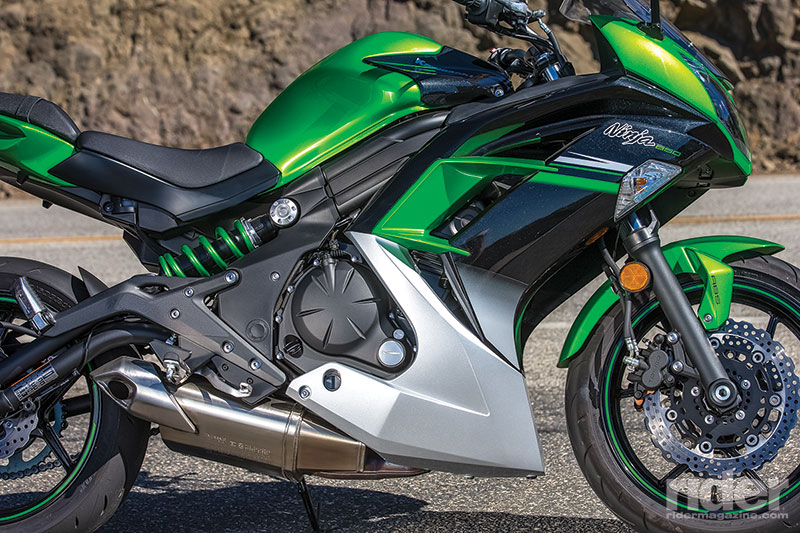
If looking the part of a sport rider, complete with a full fairing, gorgeous metal-flecked green paint and a color-matched, side-mounted shock, is what you’re after, but the insurance quote and five-figure sticker price for a pure supersport make you choke on your latte, the Ninja 650 ABS might be worth a look. The venerable Ninja 650 has been around since 1996, and received its last major update in 2012, when the engine and exhaust were tweaked for more power and efficiency and the seat and suspension were revamped for more comfort. When ridden back-to-back with the other two thoroughly modern Millies, however, it begins to show its age.

The Ninja is less than half an inch longer than the compact FZ-07, with the same 31.7-inch seat height and the highest footpegs of the bunch, giving it a sporting and flickable nature, but it still feels like the largest specimen by far. No doubt much of that is due to its hefty 467-pound curb weight, 38 pounds more than the Suzuki and 69 more than the Yamaha. This isn’t helped by the fact that it makes the least horsepower and torque, with a dip between 4,000 and 5,500 rpm—right where most casual riders will spend the majority of their time—and keeping it in the fun zone above 5,500 rpm requires a bit of effort. Sporty-looking petal-type discs slow all that momentum, and our test bike also came equipped with ABS. Brake feel is only slightly better than the wooden feel of the SV650, but showed signs of fading during extended stints of aggressive riding on curvy descents.
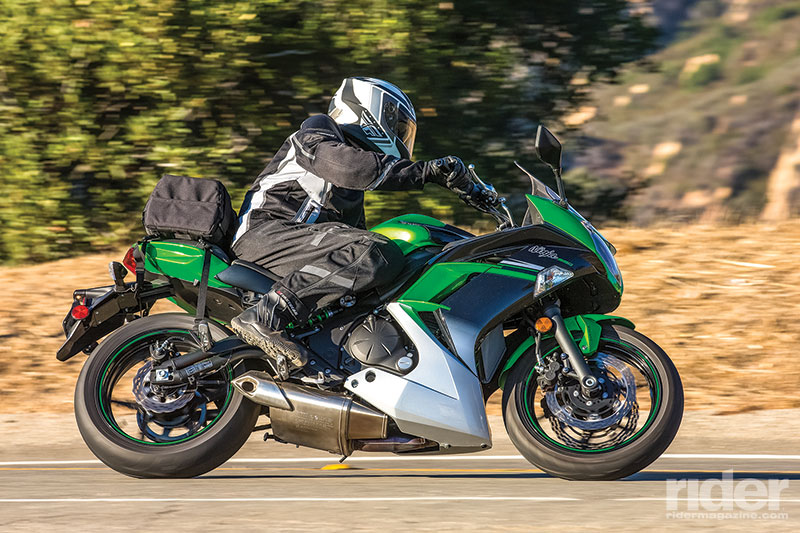
Helmet: Fly Street Conquest
Jacket & Pants: Firstgear Mesh Tex & HT Air
Boots: Joe Rocket Meteor FX
Tail Bag: Rev Pack
As a freeway commuter the Ninja shines, with the fairing and windscreen providing protection from the elements and the forward-mounted mirrors affording visibility of more than just your elbows. The seat has ample padding, leaving me comfortable even after a full day in the saddle. Like most parallel twins, it can get a bit buzzy at higher rpm, but it was never enough to really annoy me. The instrument display is simple and easy to read, though it lacks the gear indicator found on the other two bikes.
Pulling into your local hangout or lunch stop will turn heads, especially if you’ve opted for the Candy Lime Green/Metallic Spark Black paint scheme. I prefer something a bit stealthier, however—a wolf in sheep’s clothing, so to speak. And so the flashy Ninja takes third place in this Fun Size comparison.
MILKY WAY:
SUZUKI SV650
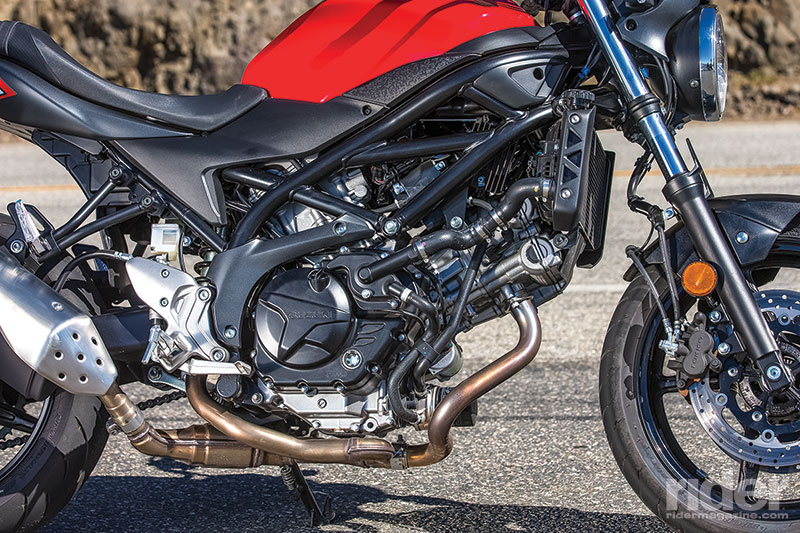
I reviewed the SV650 back in the September issue, and after a few more months of quality time with this friendly little bike, my initial impressions have only been reinforced. The SV’s approachability is complemented by its willingness to have fun. It will breeze through traffic as sedately and unobtrusively as your favorite aunt in her Buick, and when the road opens up and the curves tighten into hairpins, it sheds its puppy dog demeanor to become a willing accomplice to mischief—if that’s your thing, of course.
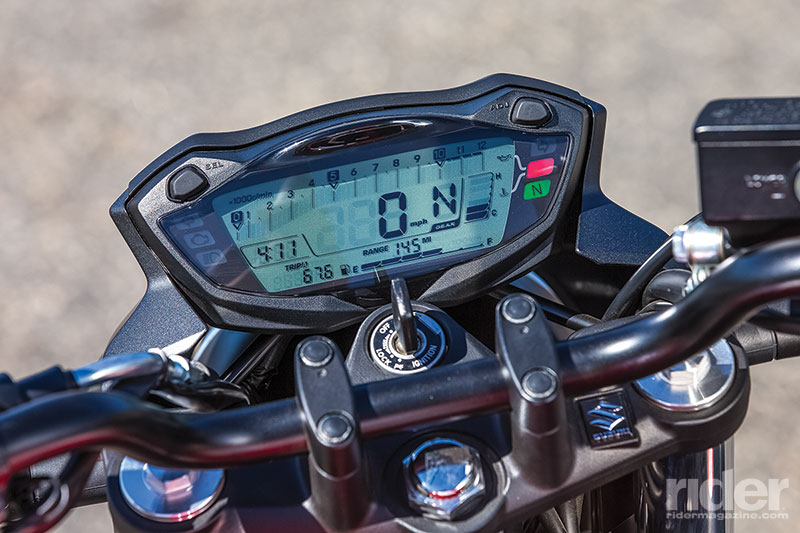
We were surprised to see that the Suzuki makes the most peak horsepower (a tested 71.7) and it keeps pumping out torque at least 900 rpm beyond the other two, topping out at 45.6 lb-ft at a whopping 8,000 rpm. The delivery of that power is linear and predictable, and with the Low RPM Assist making easy work of launches, stop-and-go traffic and slow-speed maneuvering, narrow bars and an easy reach to the ground from its slim seat, the SV gets top marks for ride-ability. It also has the best instrument cluster of the trio. The display is positioned forward, over the headlight, making it easy to glance down for information like speed, fuel level, range, gear selection, rpm and time of day (helpful when you’re running late for work because you opted to take the “fun way”).
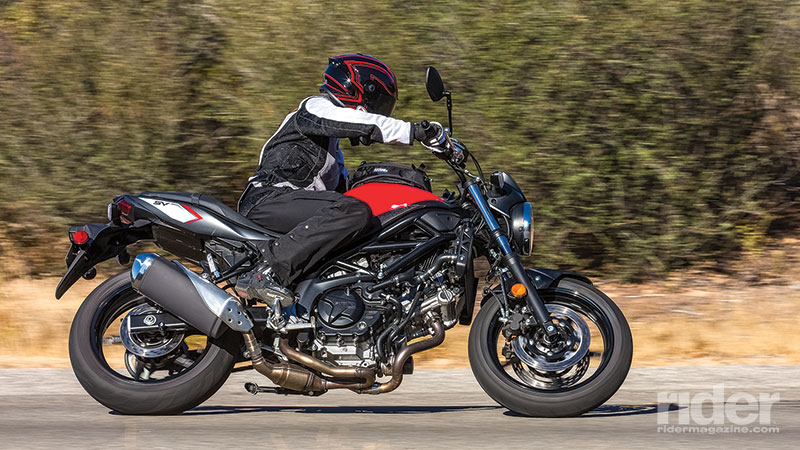
Helmet: Bell Star
Jacket & Pants: Fly Flux Mesh & Joe Rocket Alter Ego
Boots: Sidi Vertigo Lei
Tank Bag: Chase Harper USA
As I noted in my original review, the SV serves up a smooth and stable ride. On this test, reviewers praised its stability, thanks in no small part to its long (56.9-inch) wheelbase. The brakes got low marks, however, with the front brake especially offering a very wooden feel and inspiring little confidence when the pace picked up through the twisties. On the plus side, ABS is available for an additional $500.
The only other major complaint from the group was with the SV650’s seat. Suzuki did a great job of lowering the seat height and trimming the width to appeal to smaller riders, but in doing so it seems to have been trimmed to the bare minimum. If the bike was mine to keep, I would consider an aftermarket seat with thicker foam that gives me both more cushioning and more legroom, but inseam-challenged riders will likely find the stocker a reasonable tradeoff.
All told, the SV650 is a smooth and satisfyingly fun bike in a familiar, easy-to-ride, easy-to-make-mischief-on package. Though it isn’t my favorite, it’s a close second.
BUTTERFINGER:
YAMAHA FZ-07
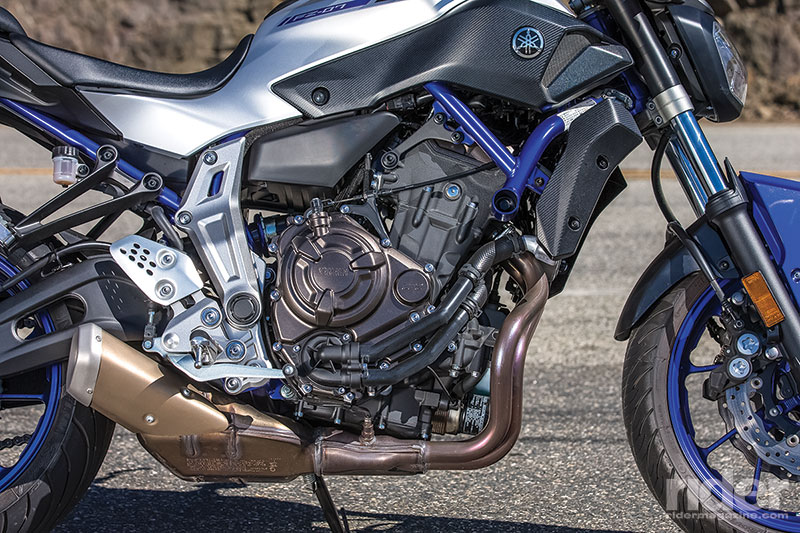
Boil a middleweight sportbike down to its raw essence, and what you get will look very much like the FZ-07. There’s an edge to the FZ that is missing from the other two, and it’s that edge that makes this bike so darn much fun.
The word that came to mind when I first climbed aboard the FZ and twisted the throttle was “immediate.” The dyno chart tells the tale: there’s no windup to the power curve. Things happen immediately and the FZ out-pulls both of the other bikes all the way to about 7,500 rpm, where the Suzuki finally surpasses it. It reaches its peak torque of 47.6 lb-ft, the highest of the bunch, at only 6,400 rpm. What you’ve got on your hands is a nimble, sub-400-pound bike with a comfortable, neutral riding position and a 270-degree crank in the fiesty Crossplane Concept engine. It serves up smooth, ample power throughout the “real-world” range in which we spend most of our time, and its angry howl betrays its intentions to get from here to there NOW. It’s the Bart Simpson of the group: hanging out with this bike could very well get you in trouble.
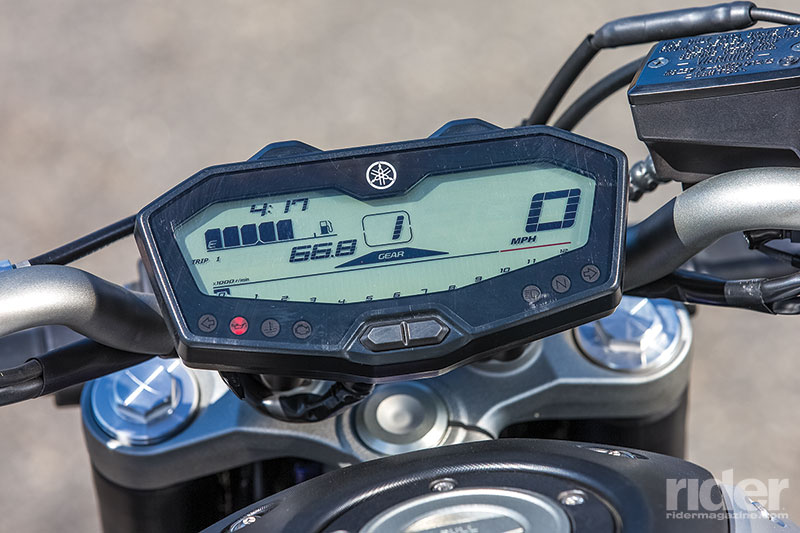
The beauty of it, though, is that with a bit of throttle restraint, the FZ-07 is a sensible ride. It returned the highest fuel economy figures of the three, and its wide rear tire (a 180, as opposed to the 160 on both the Kawi and Suzuki), shod with a Michelin Pilot Road 3, offsets any potential skittishness with a solid, planted feel. Styling is sporty without being too overbearing. ABS is not available, but 4-pot opposed piston calipers squeezing 282mm dual-floating wave rotors up front keep the FZ reined in and under control. And, unlike its big brother, the FZ-09, the chassis and engine are well matched; it never feels like the engine is trying to wrench itself free from the rest of the machine. It’s just what it’s supposed to be: quick, nimble and, most importantly, fun to ride.
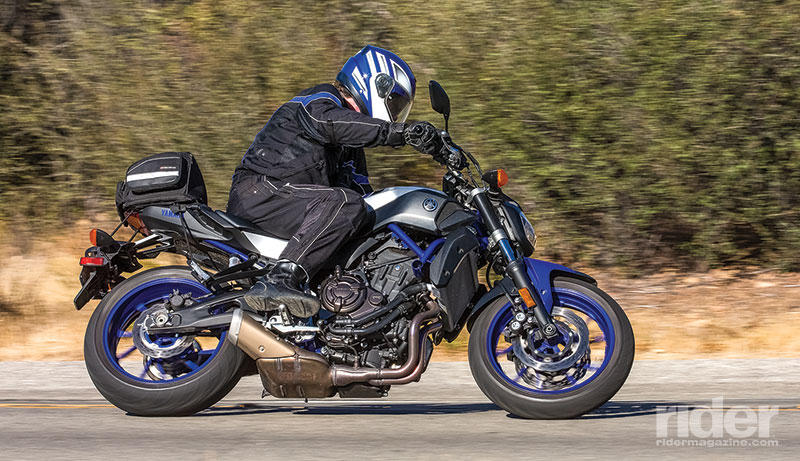
Helmet: Nolan N104
Jacket & Pants: Olympia Moto Sports Air Glide
Boots: Tourmaster Solution WP 2.0 Air
Tail Bag: Firstgear
When I throw open that warehouse door and survey my options, my eye keeps returning to the little FZ-07, and I’m as powerless as a moth when it spies a hot, bright Coleman lantern. That’s why it’s my top choice for a Fun Size ride.
SCROLL TO THE BOTTOM TO SEE DYNO CHARTS
2016 Kawasaki Ninja 650 ABS Specs
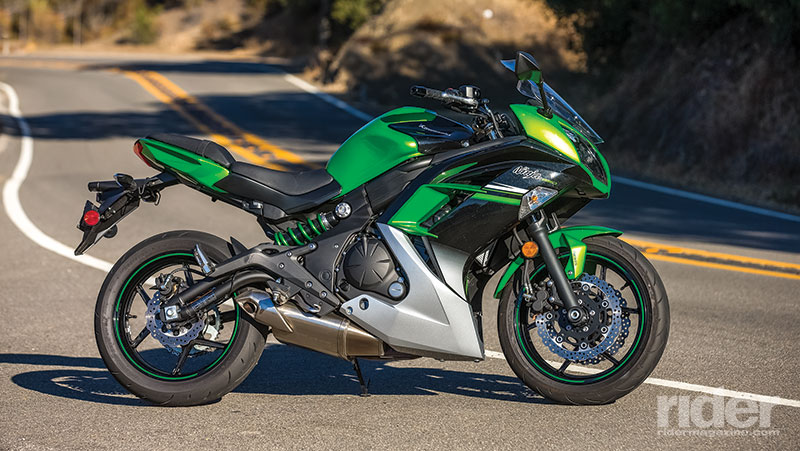
Base Price: $7,599
Warranty: 1 yr., unltd. miles
Website: kawasaki.com
Engine
Type: Liquid-cooled, transverse parallel twin
Displacement: 649cc
Bore x Stroke: 83.0 x 60.0mm
Compression Ratio: 10.8:1
Valve Train: DOHC, 4 valves per cyl.
Valve Insp. Interval: 15,000 miles
Fuel Delivery: DFI w/ 38mm throttle bodies x 2
Lubrication System: Wet sump, 2.4-qt. cap.
Transmission: 6-speed, cable-actuated wet clutch
Final Drive: O-ring chain
Electrical
Ignition: TCBI w/ electronic advance
Charging Output: 372 watts max.
Battery: 12V 10AH
Chassis
Frame: High-tensile steel twin-tube perimeter, tubular steel swingarm
Wheelbase: 55.5 in.
Rake/Trail: 25 degrees/4.3 in.
Seat Height: 31.7 in.
Suspension, Front: 41mm fork, non-adj., 4.9-in. travel
Rear: Single offset lay-down shock, 7-position adj. preload, 5.1-in. travel
Brakes, Front: Dual 300mm petal-type discs w/ 2-piston floating calipers & ABS
Rear: Single 220mm petal-type disc w/ 1-piston floating caliper & ABS
Wheels, Front: Cast, 3.50 x 17 in.
Rear: Cast, 5.0 x 17 in.
Tires, Front: 120/70-ZR17
Rear: 160/60-ZR17
Wet Weight: 467 lbs.
Load Capacity: 439 lbs.
GVWR: 906 lbs.
Performance
Fuel Capacity: 4.2 gals., last 1.0 gal. warning light on
MPG: 87 PON min. (low/avg/high) 45.5/50.1/53.2
Estimated Range: 212 miles
Indicated RPM at 60 MPH: 4,400
2017 Suzuki SV650 Specs
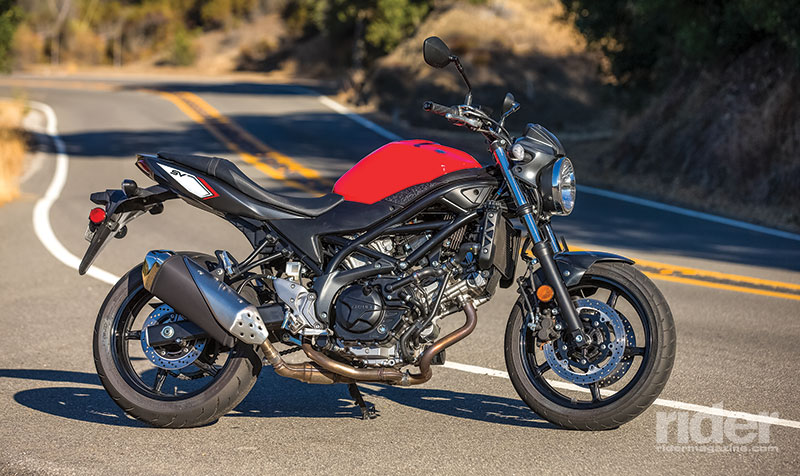
Base Price: $6,999
Warranty: 1 yr., unltd. miles
Website: suzukicycles.com
Engine
Type: Liquid-cooled, transverse 90-degree V-twin
Displacement: 645cc
Bore x Stroke: 81.0 x 62.6mm
Compression Ratio: 11.2:1
Valve Train: DOHC, 4 valves per cyl.
Valve Insp. Interval: 14,500 miles
Fuel Delivery: DFI w/ STDV & 39mm throttle bodies x 2
Lubrication System: Wet sump, 2.9-qt. cap.
Transmission: 6-speed, cable-actuated wet clutch
Final Drive: O-ring chain
Electrical
Ignition: Electronic
Charging Output: 375 watts max.
Battery: 12V 12AH
Chassis
Frame: High-strength steel trellis, steel beam-type swingarm
Wheelbase: 56.9 in.
Rake/Trail: 25 degrees/4.2 in.
Seat Height: 30.9 in.
Suspension, Front: 41mm fork, non-adj., 4.9-in. travel
Rear: Single link-type shock, 7-position adj. preload, 5.1-in. travel
Brakes, Front: Dual 290mm floating discs w/ 2-piston floating calipers
Rear: Single 240mm disc w/ 1-piston floating caliper
Wheels, Front: Cast, 3.50 x 17 in.
Rear: Cast, 5.0 x 17 in.
Tires, Front: 120/70-ZR17
Rear: 160/60-ZR17
Wet Weight: 429 lbs.
Load Capacity: 496 lbs.
GVWR: 925 lbs.
Performance
Fuel Capacity: 3.8 gals. (3.6 gals. CA model), last 1.0 gal. warning light on
MPG: 86 PON min. (low/avg/high) 48.1/54.1/60.7
Estimated Range: 195 miles
Indicated RPM at 60 MPH: 4,250
2016 Yamaha FZ-07 Specs
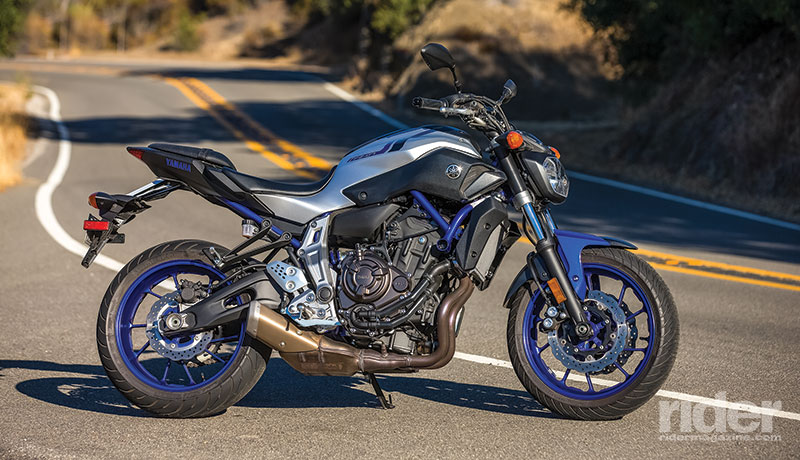
Base Price: $6,990
Warranty: 1 yr., unltd. miles
Website: yamahamotorsports.com
Engine
Type: Liquid-cooled, transverse parallel twin
Displacement: 689cc
Bore x Stroke: 80.0 x 68.6mm
Compression Ratio: 11.5:1
Valve Train: DOHC, 4 valves per cyl.
Valve Insp. Interval: 26,600 miles
Fuel Delivery: DFI w/ 38mm throttle bodies x 2
Lubrication System: Wet sump, 2.75-qt. cap.
Transmission: 6-speed, cable-actuated wet clutch
Final Drive: O-ring chain
Electrical
Ignition: Electronic
Charging Output: 410 watts max.
Battery: 12V 8.6AH
Chassis
Frame: High-tensile steel diamond, steel beam-type swingarm
Wheelbase: 55.1 in.
Rake/Trail: 24.8 degrees/3.5 in.
Seat Height: 31.7 in.
Suspension, Front: 41mm fork, non-adj., 5.1-in. travel
Rear: Single link-type shock, 9-position adj. preload, 5.1-in. travel
Brakes, Front: Dual 282mm floating discs w/ opposed 4-piston calipers
Rear: Single 245mm disc w/ 1-piston floating caliper
Wheels, Front: Cast, 3.50 x 17 in.
Rear: Cast, 5.50 x 17 in.
Tires, Front: 120/70-ZR17
Rear: 180/55-ZR17
Wet Weight: 398 lbs.
Load Capacity: 385 lbs.
GVWR: 783 lbs.
Performance
Fuel Capacity: 3.7 gals., last 0.7 gal. warning light on
MPG: 86 PON min. (low/avg/high) 54.6/59.3/63.3
Estimated Range: 217 miles
Indicated RPM at 60 MPH: 4,100

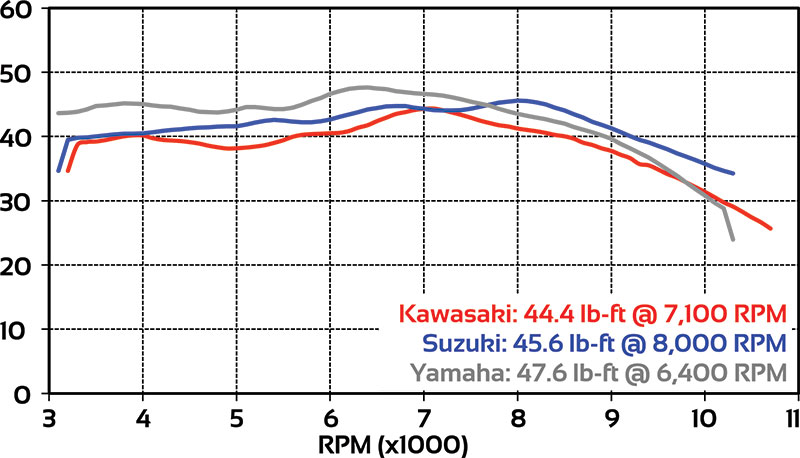

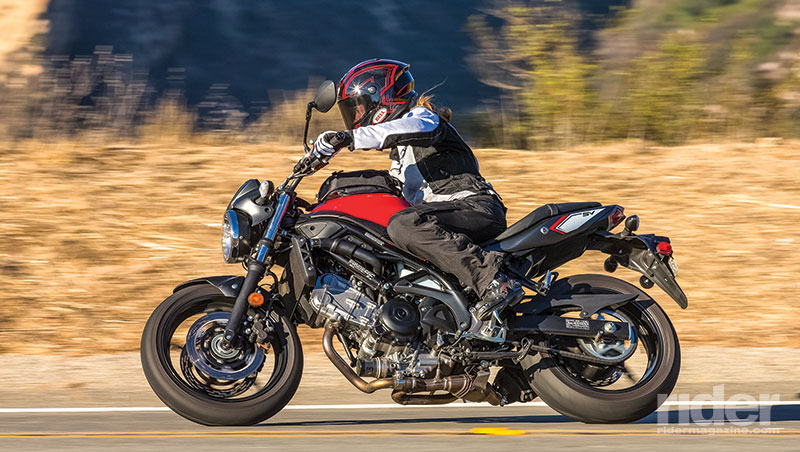
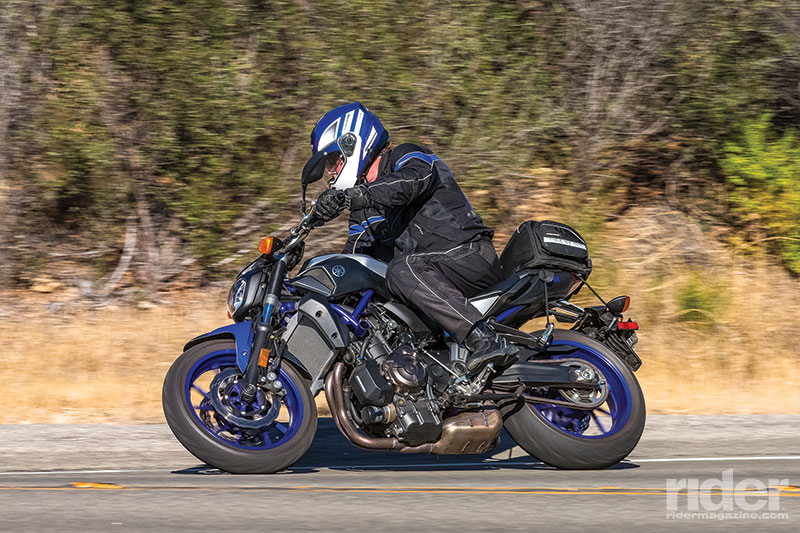

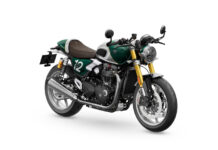
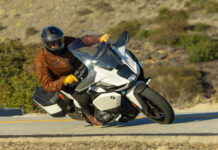
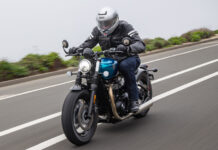
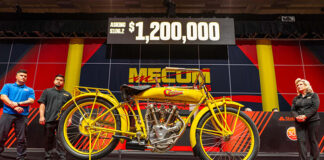

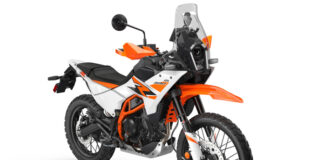

[…] to the forum. 3 to 4 hours of traffic a day! Here's a Rider Magazine Comparison Review: 2016 Kawasaki Ninja 650 ABS vs. 2017 Suzuki SV650 vs. 2016 Yamaha FZ-07 Oz BMW K1200R Sport Oz is online now Quote Quick […]
Wow these are the (3) bikes that are always mentioned as great choices for new riders as well as experienced riders for a great purchase. Although I have purveyed the Kawasaki z650 in place of the Ninja (as known its the same bike). I think I like the Suzuki SV650 because of fit bit I feel the kawz650 gives more durability and heft. At the end of the day I don’t think you loose on any of these (3) and it really does come down to fit and preference. For fit: Suzuki SV650 For preference toss up between. Zed650 and sv650 I think which ever one I can get for the cheapest at the end of this year is going to make the difference. Here’s the monkey wrench though I’m considering the Yamaha XSR700. Choices…
Wish this review would have included the revised 2017 Ninja 650 as I am trying to decide between the three. Isn’t 2016 th3 previous model? Also I weigh 215-200 with gear on and would like to take the bike t a track day a couple times a year. Isn’t the FZ-07 suspension too soft for that for my weight?
I second the comment about reviewing the newer Ninja 650. I’d like to know how much of an improvement it is.